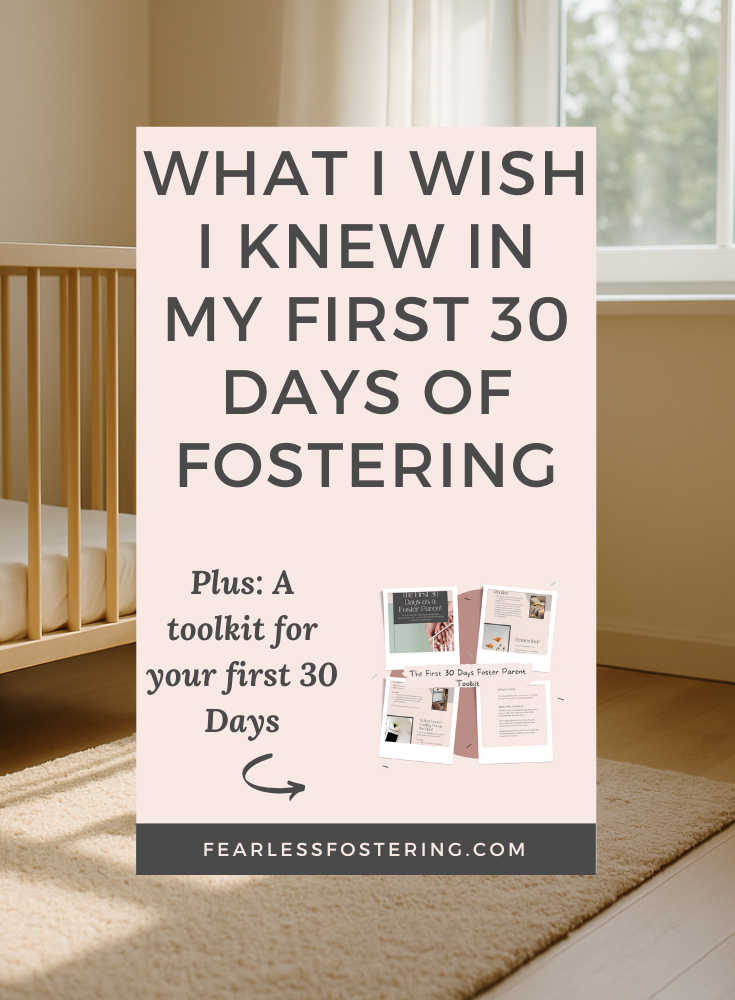
The first 30 days of fostering are an emotional, beautiful, and often overwhelming blur. There’s paperwork, appointments, big feelings, and small wins that no one else sees. When I think back to the beginning of our fostering journey, I remember being simultaneously filled with conviction and completely undone by the weight of it all.
If you’re in that space—or heading toward it—I want to share what I wish someone had told me during those early days. This isn’t a list of rules or guarantees. It’s a reflection, a lifeline, and hopefully, a moment of comfort for wherever you are right now.
1. You won’t feel “ready”—and that’s okay.
No amount of training can fully prepare you for what it’s like to welcome a child into your home with their entire world turned upside down. I remember expecting to feel more certain, more equipped. Instead, I felt messy, unsure, and afraid of getting it wrong.
What I’ve learned since: the goal isn’t to be perfect, it’s to be present. You can show up imperfectly and still offer healing.
2. The behaviors aren’t personal—but they are communication.
In those first few weeks, I wish I had truly understood how much a child’s behavior is a reflection of their nervous system, not a judgment of my parenting. Meltdowns, shutdowns, aggression—it’s trauma speaking.
Responding with regulation instead of reaction makes all the difference, and it starts with your own breath.
3. You need your people—and they need to understand the system.
Foster care can feel incredibly isolating, especially when the people around you don’t understand the “why” behind your decisions.
I wish I had prepared a few close friends or family members with trauma-informed language and expectations early on. Having a village that gets it makes everything more bearable. And if you don’t have that? That’s exactly why I created the Foster Mama Lifeline.
4. You’ll grieve—even when things go “well.”
I wasn’t prepared for the layered grief that comes with fostering: the grief of the child, the grief of bio parents, the grief of unmet expectations. Even reunification—when it’s the right outcome—can feel like a heartbreak.
Give yourself permission to feel all of it without judgment.
5. You won’t know everything—and that doesn’t disqualify you.
You don’t need to be a trauma expert, a behavior analyst, or a supermom to be a good foster parent.
You need to be willing to learn, listen, and adapt. And when you need help (which you will)—asking for it is a sign of strength, not failure.
6. Routines create safety—for everyone.
One of the best things I did early on was establish predictable routines: mealtimes, bedtime rituals, daily check-ins.
Trauma thrives in chaos, and routines build trust. Start small and be consistent. It will pay off more than you think.
7. Court dates, caseworkers, and system stuff will take up more space than you expect.
Between appointments, calls, meetings, and paperwork, the system will demand more of your time than you ever anticipated.
Be gentle with yourself when the logistics feel like too much—and don’t be afraid to advocate for your time and mental health.
8. You’ll question yourself—often.
One day you’ll feel like you’re making progress, and the next you’ll wonder if you’re failing.
That’s normal. That’s foster care.
Keep anchoring in your values and remember why you said yes.
You’re doing better than you think.
9. Connection is always more important than control.
It’s tempting to fall into survival mode and try to manage behavior with rules and consequences.
But the heart of foster parenting is relationship.
Connection regulates behavior more than punishment ever could. Choose connection every time.
10. You’re not alone—even if it feels like it.
There are thousands of foster parents navigating the same heartache, beauty, and uncertainty.
I created the First 30 Days Toolkit because I didn’t want another mama to go through the beginning without something solid to hold onto.
If you’re in your first 30 days—or if you just need to feel more supported—I’d love to share the toolkit with you.
It includes trauma-informed scripts, reflection pages, printable resources, and support you can use right now.
🧡 Click here to grab the First 30 Days Toolkit.
You’re not doing it wrong.
You’re doing something really hard.
And I’m right here with you.
With love,
Cathleen
+ show Comments
- Hide Comments
add a comment